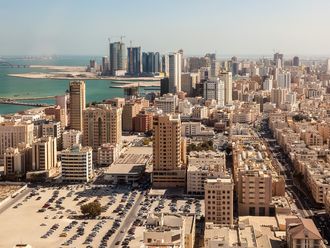Abu Dhabi: A Bahraini shaikha who works as a police officer is on trial for torturing two doctors while they were in detention during political unrest in the Gulf Arab kingdom in 2011, according to a senior official at Bahrain’s Public Prosecutor’s office.
Shaikha Noora Bint Ebrahim Al Khalifa is also facing a separate trial for physically assaulting Aayat Al Qormozi, a young female opposition activist, while she was in detention during the same period, Nawaf Hamza, head of the Public Prosecution’s Special Investigation Unit, said.
“The charge is that she used torture, force and threats against the victims Zahra Al Sammak and Kholoud Al Durazi to make them confess to a crime,” Hamza, referring to the two doctors, said by telephone.
According to Al Sammak’s lawyer, the alleged torture took place in March and April 2011, a period when the kingdom was convulsed by unrest following the start in February of demonstrations led by Shiites demanding democratic change in the country.
Reuters submitted a request for comment from Shaikha Noora on the charges against her to her lawyer, Fareed Gazi. He responded later saying he had spoken to her but that she did not wish to comment.
“Of course, she denies all the charges against her,” Gazi said, referring to the allegations at issue in both of the trials.
An independent commission said 35 people died during the unrest and two months of martial law that followed, but the opposition puts that number at more than 80. The government rejects the figures and has accused opposition groups of being linked to Iran.
Mass protests
Shaikha Noora is about 29 years old, according to media reports, and is one of many members of the family who hold jobs in the public sector. At the time of the protests that shook Bahrain in 2011, she worked in the police drugs control unit, but has since moved to another department, according to Gazi.
Bahrain’s Information Minister, Samira Rajab, confirmed Shaikha Noura was on trial in both cases.
“There was an investigation and her case was then referred to the court,” she told Reuters.
Rajab said Shaikha Noora’s trial was part of the Bahraini government’s accountability drive following the publication of the so-called “Bassiouni” report last year.
Widespread and excessive force, including confessions under torture, was detailed in a commission led by Cherif Bassiouni, a respected United Nations human rights lawyer, which published its findings and recommended measures to stop them.
The Bahrain government says it has taken steps to address the brutality of security forces by dismissing those responsible and introducing cameras at police stations to monitor abuses.
Bahrain drew fierce criticism from abroad for arrests of doctors and nurses during and after the uprising.
Since March 2011, at least 60 health professionals have been tried and sentenced to jail terms of up to 15 years on charges including attempting to bring down the government, according rights group Physicians for Human Rights.
Martial law
Most appealed and the majority had their sentences reduced or quashed, including Al Sammak, one of the doctors Shaikha Noora is alleged to have tortured.
An anesthetist, Al Sammak was initially sentenced by a military court to five years in jail but was later acquitted by a civil court, according to her lawyers. Al Durazi was detained for allegedly providing false news about people injured in the unrest and inciting hatred of the government.
In the second case against Shaikha Noora, activist and poet Aayat Al Qormozi, born in 1991, says the princess applied electric shocks to her face, spat in her mouth and beat her while she was in detention, Al Qormozi’s lawyer Reem Khalaf said. However, the charge against Shaikha Noora in this case makes no reference to torture.
Al Qormozi was jailed for a year in 2011 for insulting the king, taking part in illegal gatherings and inciting hatred against the government, Khalaf said.
She was freed after serving only several months, Khalaf said, adding she did not know the reasons for her early release. Her case was later dismissed by the public prosecutor, again for reasons she did not know, Khalaf said.
Khalaf added that the trial of Shaikha Noora on the charges relating to Al Qormozi had been running since June 2012. The next hearing would be on 7 February, she said.
In the case concerning the two doctors, Shaikha Noora’s lawyer said the princess’s trial had started in October 2012 and that the next hearing was set for February 3.
The opposition wants a constitutional monarchy and a more equitable political system that would allow them to have greater representation, ending decades-old discrimination against them in jobs including the army and security forces.
The government denies discriminating against the Shiite population.












